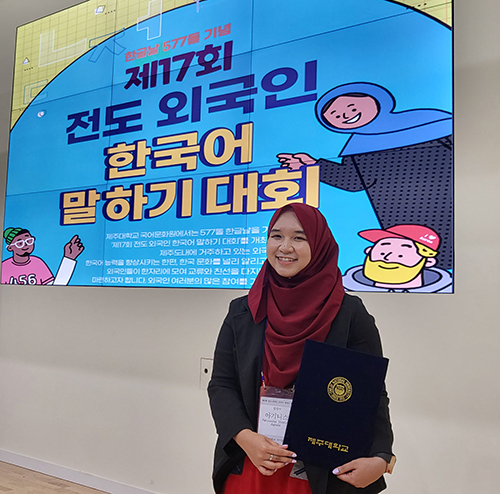The Winner of the JNU 17th Korean Speaking Contest for International Students Tells Us Her Secrets for Improving Your Korean Skills!

This past October 7th, a Korean Speaking Contest for international students was held in the Humanities Building #2 at JNU. Around 20 students from the Korean Language Program, as well as from different undergraduate and graduate degrees of our school participated by talking about their daily lives, their professional interests, and the way in which learning Korean has changed their worldview.
The winner of the first place was Shofura Agisda Fatunnisa, an Indonesian student currently enrolled in the master’s Interdisciplinary Course of Korean Language as a Foreign Language. She has been learning Korean for around seven years and now she is studying to become a Korean teacher. Evidently, one cannot help but wonder how she became so proficient in this language and what drove her to wanting to become a teacher. Thus, The Islander staff approached her eager to know what her language journey has been like.
To start with, she started learning Korean because she is a language maniac – as she defines herself – and she wanted to learn as many as possible. She found that studying Korean was fun, mainly because of the alphabet. In addition to that, the power of Hallyu attracted her, as it was not that big of a global phenomenon as it is right now when she started studying, and she found herself wanting to become a bridge between Korea and Indonesia.
She started learning by herself around 2015, just when she became a senior in high school. Later, she decided to study a major in Korean Language Education. She thought it was easy at first because all she had to do was memorize the things she was given in class. Yet, in her own words, “the more I learned, the more I realized I knew nothing.” She found Korean increasingly complex, as the grammar, the phonetics, and the lexical structures all needed thorough understanding. Plus, she deemed it necessary to start learning Chinese characters too. But even if the journey appeared to become harder and harder, she set in her mind that no matter how difficult it could get, she would always enjoy learning the language.
Finally, while she states that she does not have any general tips to become proficient in Korean as “it depends on the learning style of each person,” she does indeed recommend reading webtoons and books in Korean, listening to music in Korean, and watching dramas or movies also in Korean. While doing so, one needs to write down the words that are not familiar to what one has learned, and then studying them. And finally, “speaking with Korean friends will not only obviously improve one’s speaking skills, but the listening skills too!”.

